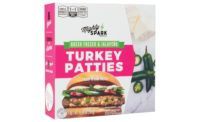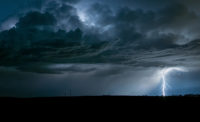There are plenty of reasons for fans to go to a sporting event: a game-winning home run, a clutch three-point shot as the clock winds down, a long touchdown throw. Food can’t be overlooked, either. A hot dog and a beer (or several of each) is a typical stadium meal, but today’s stadiums are offering more and more variety in the types of food items they offer. For enterprising meat processors, they represent an opportunity to get their message and their products in front of tens of thousands of hungry sports fans.
Hickory Foods, located in
“Three years ago, we had our first deal done with the Chicago Cubs, and since then it’s worked out great,” says Charlie Anderson, marketing director. “Our numbers are great inside the stadium as well as outside, in the stores, and we decided to start progressing with it.”
In addition to the Cubs, the company also has deals with the Atlanta Braves, New York Mets, Philadelphia Phillies and the Jacksonville Jaguars. In each case, the Bubba Burger is the official or preferred burger of the team and of the stadium. Hickory Foods also sells its burgers in every location.
“One of the reasons that we went with baseball is it’s a summertime game,”
Along with putting the company’s name in front of all the fans in the ballpark with signage and promotions on the scoreboards, Hickory Foods also promotes its Bubba Burgers with home plate signage to reach out to the fans who aren’t at the game.
“People can see it while watching TV and get that reinforcement to go pick up Bubba Burgers at their local grocery store freezer,”
Blue Grass Quality Meats, in
“We thought it was a great venue, and we wanted to see how we could get involved with it,” says David Kegley, vice president sales and marketing. “They’ve been a tremendous partner, very professional to deal with, and we’re very pleased with how that’s shaped.”
Blue Grass is the official sausage and the official deli meat of the Bengals. The stadium’s concession areas and catering sell the company’s mettwurst, bratwurst and Italian sausage, as well as barbeque and deli meats. Last year, Blue Grass produced about 65,000 sausages for the stadium, in addition to substantial deli meat sales.
The concessions areas all have backlit signs with the Blue Grass logo, and the rail strips on the menu board all describe the sausages as being Blue Grass bratwurst or mettwurst. This year, the stadium unveiled the Blue Grass Grill, a 30-foot-long concession vending area, designed to act as a meeting place for fans. Blue Grass worked with Aramark, the stadium’s concessionaire, to develop it.
“[There is a] grill in the middle, and they grill our products on that flat grill, along with some onions and peppers to create a sense of theater,” Kegley says, “and then they flanked it on both sides with premium beer.” The resulting location, he says, is an ideal place for people to meet before the game or at halftime.
Hot dogs, hamburgers… and more
The traditional stadium foods — hot dogs, pizza, burgers — will no doubt always be strong sellers. As evidenced by Blue Grass’ partnership with the Bengals, the market is by no means limited to large, national processors. A well-known local brand is also an attractive partner for professional sports teams.
“We want something that’s going to have some recognition with the fans, where the quality level is going to be a positive for them,” says Vince Cicero, director of corporate sales and marketing for the Bengals. “We’re looking for someone who has a strong reputation within the region, not only
There are only a limited amount of professional teams in the country, but there are plenty of venues and opportunities to gain some recognition. Both Blue Grass and Hickory Foods have partnered with race tracks in the past, for example. There are also numerous minor-league and independent sports teams around the country, and many of them are willing to partner with local companies and experiment with unique items.
Take turkey testicles, for example. In some Asian countries, they’re a premium item. In the
“Our motto is ‘Fun is good,’ and we always try to do things that are fun for everyone out here at the ballpark,” explains Matt Meola, director of media and public relations. “We thought this was an idea that was rooted in fun and was an interesting, unique experience as well.”
“We really wanted to provide the Canaries and the public a little more knowledge about this product, because there are a lot of bars around the nation that use them as bar food,” adds Rebecca Steele, director of sales and marketing for Dakota Provisions. “Nobody’s really picked up on that in South Dakota, and we were hoping that by launching that in a venue like the Canaries, that we would get them placed in other venues as well.”
Dakota Provisions holds the registered trademark on Fowl Balls. The partnership came together through one of the company’s employees, whose daughter interned for the Canaries.
“We kicked around the idea, and we all absolutely loved it and thought it would be a great way to offer our fans a unique product at the stadium while at the same time getting some headlines with a fun, minor-league promotion at the ballpark,” Meola says. He adds that the Canaries were sent a box of the product before agreeing to the deal. The people who were willing to try them all loved them and said they tasted like fried turkey.
Meola says that the Fowl Balls sold well in its initial season. Dakota Provisions sponsored several “
Steele says the company normally boxes and freezes the testicles before sending them to
Ballpark benefits
Getting a company’s name and product in front of thousands of fans is great, but that is only part of the benefits of partnering with a sports team. The real opportunity lies in using that partnership to drive sales in the processor’s other markets.
Paul Rice, chief executive officer of Blue Grass Meats, says the company’s relationship with the Bengals is great name recognition.
“We saw it as a very good opportunity to get our name out there and our product out there. People will try it at the stadium, see that it’s ours, and hopefully go to the store to get it.”
“We’re driving our fans [with] a product that can get at Kroger or Meijer within the marketplace, because we certainly wouldn’t want to select a niche brand or a line that you couldn’t buy at the grocery level,” he says.
Blue Grass has taken advantage of the partnership by extending the relationship to the retail level. The company released a line of sausages that have the Bengals logo on the packaging and has incorporated the logo in outdoor and print advertising. It has also run contests at supermarkets by giving away coolers that feature the logos of the Bengals, Blue Grass and the specific retailer.
“[That promotion] calls to the customer’s attention the opportunity to purchase at that retailer and engage our products in their tailgating experience,” he says. “We’re leveraging the sponsorship to our retail side to drive additional business for our retail partners.”
Hickory Foods has helped make its promotions a success by giving fans an opportunity to sample the product.
“It was very important to give the fans a taste of the product, so they could go home and pick up a box in their local store. That’s the most important thing,”





